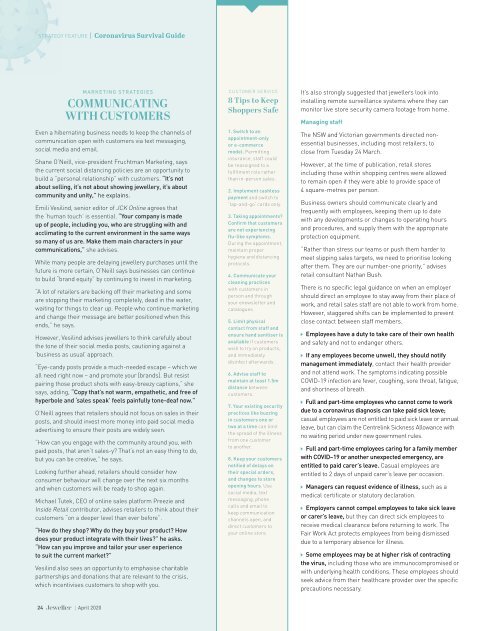Jeweller - April 2020
• Conquering Coronavirus: protect and prepare your business during the pandemic • Time frame: exploring five years of change in the watch category • Watch this space: a showcase of best-selling and new release watches
• Conquering Coronavirus: protect and prepare your business during the pandemic
• Time frame: exploring five years of change in the watch category
• Watch this space: a showcase of best-selling and new release watches
Create successful ePaper yourself
Turn your PDF publications into a flip-book with our unique Google optimized e-Paper software.
STRATEGY FEATURE | Coronavirus Survival Guide<br />
MARKETING STRATEGIES<br />
COMMUNICATING<br />
WITH CUSTOMERS<br />
Even a hibernating business needs to keep the channels of<br />
communication open with customers via text messaging,<br />
social media and email.<br />
Shane O’Neill, vice-president Fruchtman Marketing, says<br />
the current social distancing policies are an opportunity to<br />
build a “personal relationship” with customers. “It’s not<br />
about selling, it’s not about showing jewellery, it’s about<br />
community and unity,” he explains.<br />
Emili Vesilind, senior editor of JCK Online agrees that<br />
the ‘human touch’ is essential. “Your company is made<br />
up of people, including you, who are struggling with and<br />
acclimating to the current environment in the same ways<br />
so many of us are. Make them main characters in your<br />
communications,” she advises.<br />
While many people are delaying jewellery purchases until the<br />
future is more certain, O’Neill says businesses can continue<br />
to build “brand equity” by continuing to invest in marketing.<br />
“A lot of retailers are backing off their marketing and some<br />
are stopping their marketing completely, dead in the water,<br />
waiting for things to clear up. People who continue marketing<br />
and change their message are better positioned when this<br />
ends,” he says.<br />
However, Vesilind advises jewellers to think carefully about<br />
the tone of their social media posts, cautioning against a<br />
‘business as usual’ approach.<br />
“Eye-candy posts provide a much-needed escape – which we<br />
all need right now – and promote your [brands]. But resist<br />
pairing those product shots with easy-breezy captions,” she<br />
says, adding, “Copy that’s not warm, empathetic, and free of<br />
hyperbole and ‘sales speak’ feels painfully tone-deaf now.”<br />
O’Neill agrees that retailers should not focus on sales in their<br />
posts, and should invest more money into paid social media<br />
advertising to ensure their posts are widely seen.<br />
“How can you engage with the community around you, with<br />
paid posts, that aren’t sales-y? That’s not an easy thing to do,<br />
but you can be creative,” he says.<br />
Looking further ahead, retailers should consider how<br />
consumer behaviour will change over the next six months<br />
and when customers will be ready to shop again.<br />
Michael Tutek, CEO of online sales platform Preezie and<br />
Inside Retail contributor, advises retailers to think about their<br />
customers “on a deeper level than ever before”.<br />
“How do they shop? Why do they buy your product? How<br />
does your product integrate with their lives?” he asks.<br />
“How can you improve and tailor your user experience<br />
to suit the current market?”<br />
Vesilind also sees an opportunity to emphasise charitable<br />
partnerships and donations that are relevant to the crisis,<br />
which incentivises customers to shop with you.<br />
CUSTOMER SERVICE<br />
8 Tips to Keep<br />
Shoppers Safe<br />
1. Switch to an<br />
appointment-only<br />
or e-commerce<br />
model. Permitting<br />
insurance, staff could<br />
be reassigned to a<br />
fulfilment role rather<br />
than in-person sales.<br />
2. Implement cashless<br />
payment and switch to<br />
‘tap-and-go’ cards only.<br />
3. Taking appointments?<br />
Confirm that customers<br />
are not experiencing<br />
flu-like symptoms.<br />
During the appointment,<br />
maintain proper<br />
hygiene and distancing<br />
protocols.<br />
4. Communicate your<br />
cleaning practices<br />
with customers in<br />
person and through<br />
your enewsletter and<br />
catalogues.<br />
5. Limit physical<br />
contact from staff and<br />
ensure hand sanitiser is<br />
available if customers<br />
wish to try on products,<br />
and immediately<br />
disinfect afterwards.<br />
6. Advise staff to<br />
maintain at least 1.5m<br />
distance between<br />
customers.<br />
7. Your existing security<br />
practices like buzzing<br />
in customers one or<br />
two at a time can limit<br />
the spread of the illness<br />
from one customer<br />
to another.<br />
8. Keep your customers<br />
notified of delays on<br />
their special orders,<br />
and changes to store<br />
opening hours. Use<br />
social media, text<br />
messaging, phone<br />
calls and email to<br />
keep communication<br />
channels open, and<br />
direct customers to<br />
your online store.<br />
It’s also strongly suggested that jewellers look into<br />
installing remote surveillance systems where they can<br />
monitor live store security camera footage from home.<br />
Managing staff<br />
The NSW and Victorian governments directed nonessential<br />
businesses, including most retailers, to<br />
close from Tuesday 24 March.<br />
However, at the time of publication, retail stores<br />
including those within shopping centres were allowed<br />
to remain open if they were able to provide space of<br />
4 square-metres per person.<br />
Business owners should communicate clearly and<br />
frequently with employees, keeping them up to date<br />
with any developments or changes to operating hours<br />
and procedures, and supply them with the appropriate<br />
protection equipment.<br />
“Rather than stress our teams or push them harder to<br />
meet slipping sales targets, we need to prioritise looking<br />
after them. They are our number-one priority,” advises<br />
retail consultant Nathan Bush.<br />
There is no specific legal guidance on when an employer<br />
should direct an employee to stay away from their place of<br />
work, and retail sales staff are not able to work from home.<br />
However, staggered shifts can be implemented to prevent<br />
close contact between staff members.<br />
Employees have a duty to take care of their own health<br />
and safety and not to endanger others.<br />
If any employees become unwell, they should notify<br />
management immediately, contact their health provider<br />
and not attend work. The symptoms indicating possible<br />
COVID-19 infection are fever, coughing, sore throat, fatigue,<br />
and shortness of breath.<br />
Full and part-time employees who cannot come to work<br />
due to a coronavirus diagnosis can take paid sick leave;<br />
casual employees are not entitled to paid sick leave or annual<br />
leave, but can claim the Centrelink Sickness Allowance with<br />
no waiting period under new government rules.<br />
Full and part-time employees caring for a family member<br />
with COVID–19 or another unexpected emergency, are<br />
entitled to paid carer’s leave. Casual employees are<br />
entitled to 2 days of unpaid carer’s leave per occasion.<br />
Managers can request evidence of illness, such as a<br />
medical certificate or statutory declaration.<br />
Employers cannot compel employees to take sick leave<br />
or carer’s leave, but they can direct sick employees to<br />
receive medical clearance before returning to work. The<br />
Fair Work Act protects employees from being dismissed<br />
due to a temporary absence for illness.<br />
Some employees may be at higher risk of contracting<br />
the virus, including those who are immunocompromised or<br />
with underlying health conditions. These employees should<br />
seek advice from their healthcare provider over the specific<br />
precautions necessary.<br />
24 | <strong>April</strong> <strong>2020</strong>


















